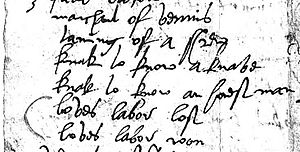Christopher Hunt facts for kids
Quick facts for kids
Christopher Hunt
|
|
|---|---|

A list of plays from Christopher Hunt's records.
|
|
| Occupation |
|
| Years active | 1584–1607 |
Christopher Hunt was a bookseller and stationer who lived in England during the late 1500s and early 1600s. He was known for selling books and writing materials in Exeter and London. Hunt played a small but important role in the history of books and even in understanding the plays of William Shakespeare.
Who Was Christopher Hunt?
Christopher Hunt was born in Blandford, a town in Dorset, England. His father, Walter Hunt, was a cordwainer, which means he made shoes.
In 1585, when Christopher was young, he moved to London. There, he became an apprentice to Thomas Man, a London stationer. An apprentice is someone who learns a trade from a skilled person. Christopher learned how to be a stationer, which meant he would sell books, paper, and other writing supplies. He trained for eight years.
After his training, in 1592, Christopher became a "freeman" of the Stationer's Company. This meant he was officially allowed to work as a stationer. The next year, he moved back to Exeter and opened his own shop. His shop was in the area of St. Martin's Church.
While in Exeter, Christopher Hunt had two books printed for him in London. These books were translations by a Cornish writer named Richard Carew. Later, before 1606, Hunt moved back to London. He opened another shop in a famous street called Paternoster Row.
Christopher Hunt was married, but we don't know his wife's name. He had at least two children. His daughter, Anne, was born in 1599. His son, Thomas, was born in 1602. Thomas also became a stationer, following in his father's footsteps.
What Books Did Christopher Hunt Print?
Christopher Hunt was involved in printing and selling several books. He didn't print them himself, but he paid others to print them for him. These books were then sold in his shops.
One of the books he had printed was a translation of an Italian poem called Godfrey of Bvlloigne. Another was a book called Examen de Ingenios, which was about understanding people's different talents. Both of these were translated by Richard Carew.
Hunt also had a book printed in 1607 called The Parricide Papist. This book was about a true crime that happened in Cornwall. Besides these, King James I gave Christopher Hunt permission to print a book called Householders practise.
Christopher Hunt and Shakespeare
Christopher Hunt is important to history because of a special discovery made in 1954. Some old papers from Hunt's records were found inside the cover of an old book. These papers were from 1603 and 1607.
On one of the papers from 1603, there was a list of 16 plays that Hunt had sold. This list included four plays by William Shakespeare:
The play Love's Labour's Won was very exciting to find on this list. It had been mentioned by another writer, Francis Meres, in 1598. However, no one had ever found any other proof that this play existed. People wondered if it was just an early name for another Shakespeare play.
Hunt's list showed that Love's Labour's Won was a real, separate play that had been published and sold. Sadly, the play itself has been lost over time. This discovery from Christopher Hunt's records helped prove that Shakespeare wrote a play that is now missing. Today, this important list is kept at the Rare Book & Manuscript Library at the University of Illinois.

